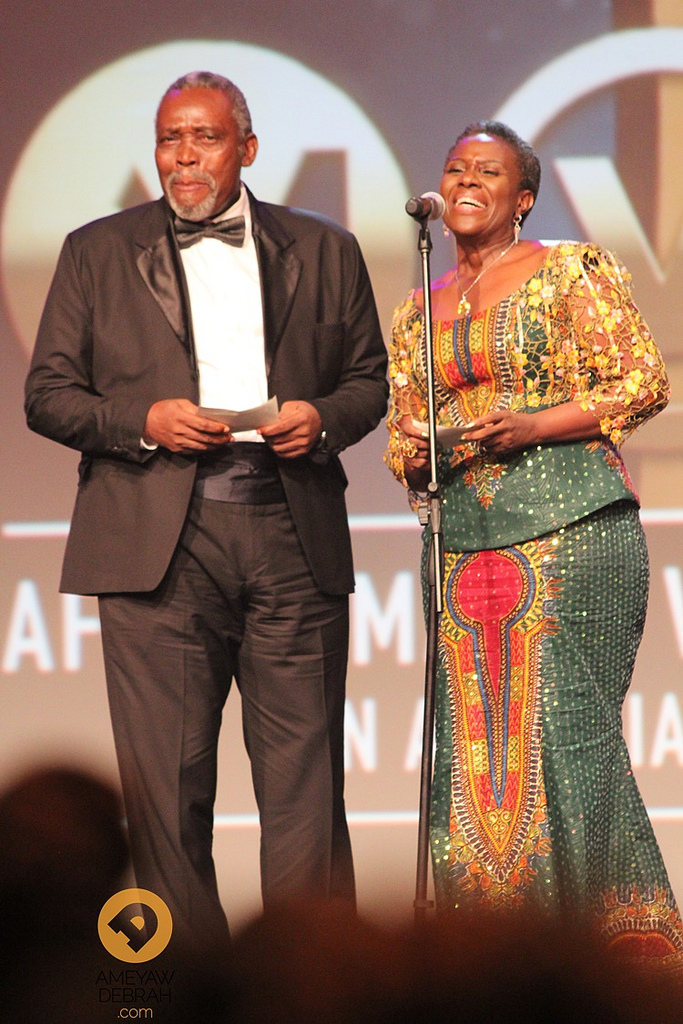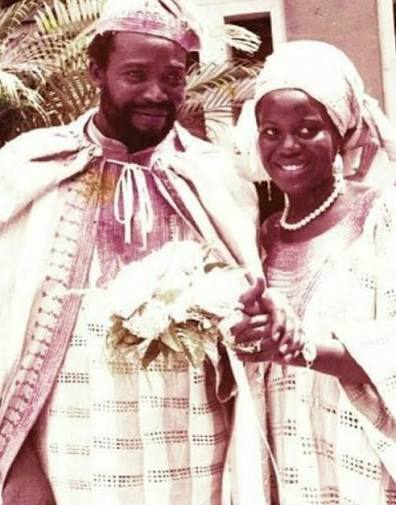There are some choices in life that arrive not with trumpets and applause, but with whispers in the dark, heavy with the weight of risk. For Joke Silva, it was not a film script that tested her mettle, nor a stage performance under glaring lights.
- Two Roads Before the Meeting
- Sparks in the Theater
- A Father’s Disapproval
- Age-Gap Marriages in 1970s Nigeria
- Between Two Generations: A Daughter’s Dilemma
- The Weight of Twenty Years
- Fathers and Daughters: The Cultural Rift
- Choosing the Heart Over Arithmetic
- Love in an Unequal Industry
- Nollywood Before Nollywood
- Building a Career Together
- Why the Age Gap Faded
- The Public Image of Risk
- Dementia and the Return of the Father’s Fear
- When Other Marriages Fell Apart
- A Different Kind of Celebrity Marriage
- Lessons Nollywood’s Younger Generation Draws
- The Legacy Written in Their Names
- Summative Close: The Long Shadow of Love
It was love—love that stood at odds with everything she had been raised to believe, love that threatened to redraw the careful lines her family had etched for her future.
The man she chose, Oludotun Jacobs—better known to the world as Olu Jacobs—was no ordinary suitor. He carried a presence that made rooms pause, a voice that seemed to command obedience, and an ambition that stretched far beyond the modest stages of Lagos.
He was a pioneer in Nigerian acting, one of the few who had trained in England and worked alongside celebrated British talents. Yet in the conservative eyes of many Nigerian families at the time, he was still “just an actor” and too old for Joke Silva.
What does it mean to risk everything for love in a society where “everything” includes your family name, your financial stability, and your place among the elite? For Joke Silva, the risk was not hypothetical. It was real, present, and perilous.
Two Roads Before the Meeting

Before their marriage in 1989, Joke Silva and Olu Jacobs were products of two very different worlds.
Joke was born in 1962 into affluence. Her mother, Dr. Marianne Abimbola Silva, was a formidable presence—one of Nigeria’s first female medical doctors and later principal of the University of Lagos School of Medicine. In such a household, discipline was not optional. Respectability was the air they breathed. Children of families like hers were expected to pursue law, medicine, or diplomacy—the kind of careers that fortified both family honor and financial security.
But even from an early age, Joke tilted toward a different rhythm. Boarding school exposed her to literature and drama, and soon the stage became her refuge. While her peers dreamed of courtrooms and hospitals, she dreamed of costumes, scripts, and lights.
Meanwhile, decades earlier in 1942, in the northern city of Kano, Olu Jacobs had been born into a very different Nigeria. His upbringing was modest, his opportunities shaped by the hunger of a nation still under colonial weight. He left for England in the 1960s, carrying ambition more than certainty, and enrolled at the Royal Academy of Dramatic Arts (RADA).
There, he was thrust into the sharp world of British television and theater. He fought for roles, sometimes facing the blunt edge of racism, but slowly carved his space. Appearances in The Professionals, The Goodies, and The Saint gave him international exposure. Yet he always knew his destiny was tethered to Nigeria, to a cultural identity still finding its footing.
By the time their worlds collided in Lagos’s theater scene of the late 1970s, both had been shaped by struggle: Joke by the burden of privilege, and Olu by the hunger of survival.
Sparks in the Theater
The meeting was not cinematic. No violins, no sudden spotlight. It was gradual—shared rehearsals, stage lights, long conversations about craft. Lagos at the time was humming with cultural energy. The National Theatre, completed in 1976, stood as a proud monument to Nigeria’s artistic ambition. Stage plays, drama festivals, and experimental performances brought together actors hungry to prove that Nigerian storytelling could rival the world’s.
In those circles, Joke and Olu found each other. She, young and radiant, with the confidence of training but still carving her space. He, seasoned, almost paternal in stature, with years abroad written into his cadence. What began as respect grew into affection, and affection into something undeniable.
But while the stage nurtured their connection, the world outside raised its eyebrows.
A Father’s Disapproval
Every love story has its opposition. For some, it is distance. For others, it is culture. For Joke Silva, it was her father’s voice—a voice that carried authority, steeped in tradition and concern, unwilling to bend.
Her father, Chief Emmanuel Afolabi Silva, was a lawyer. His daughter, born into privilege and possibility, had chosen a man twenty years her senior. It was not Olu Jacobs’ character he questioned, nor his charisma, nor his reputation as an actor. It was the sheer gulf of years that troubled him. In a society where generational lines defined authority, where fathers themselves were barely twenty years older than their daughters, the thought of her marrying a man old enough to sit alongside him at social gatherings felt impossible to accept.

For Joke, the objection cut deep. To be caught between a father’s expectation and the calling of her heart was no small storm. She respected him, admired him, and understood his fears. Yet, she also saw in Olu Jacobs something her father could not—stability, vision, and a love forged not in haste but in depth.
It was not merely a romance. It was a gamble against the arithmetic of age and the weight of tradition.
Age-Gap Marriages in 1970s Nigeria
To grasp the scale of her decision, one must understand Nigeria’s cultural climate in the 1970s. Marriages, especially among educated elites, were not simply unions of individuals but negotiations of family honor and longevity. A wide age gap carried social implications:
Longevity fears: Parents worried their daughters would be widowed early, burdened with raising children alone.
Power imbalance: Older husbands were seen as more controlling, with maturity giving them dominance.
Social whispers: A young bride with an older husband was sometimes mocked, her love dismissed as naivety or ambition.
Against this backdrop, Joke Silva’s relationship with Olu Jacobs was not just unusual—it was radical. She was a young woman in her twenties, luminous with potential. He was already a seasoned actor in his forties, with graying edges and a voice that carried years of stage command.
Her father could not reconcile the numbers. But Joke saw beyond them.
Between Two Generations: A Daughter’s Dilemma
For Joke Silva, the tension was not only romantic—it was generational. Her father’s disapproval echoed a cultural truth: in 1970s Lagos, the generational line was sacred. Fathers wanted their daughters married to peers—men who grew up in the same social circles, went to the same schools, and shared the same cultural references. A twenty-year age difference collapsed that framework.

Her father was a man of his time—educated, principled, and fiercely protective of the family’s reputation. He had worked to raise his children into Nigeria’s rising elite, with expectations that their choices would reflect that investment. In his eyes, a daughter marrying a man so much older was not only unorthodox; it was destabilizing.
Would she find happiness? Would she lose her youth to his maturity? Would she be left alone, raising children, when age eventually claimed him? These were not idle worries; they were the questions of a father who had seen enough of life’s fragility to distrust unconventional choices.
Yet, the same disapproval that weighed on him became the fire that sharpened Joke’s conviction. To love across generations was to insist that the soul, not the calendar, defined companionship.
The Weight of Twenty Years
Age is not just a number in Nigerian society—it is a symbol, a language, a code that orders respect and hierarchy. The Yoruba saying “Agba kii wa loja ki ori omo titun wo”—an elder cannot be in the marketplace while a child’s head hangs low—captures this reverence. Age dictates who speaks first, who receives deference, and who carries authority.
So, when Joke Silva chose to bind her life to Olu Jacobs, she was not only marrying a man. She was disrupting an order. A twenty-year difference was not easily digested. In a culture where age separates parent from child, Joke’s father saw in Jacobs not just a husband for his daughter but a peer, someone who could easily sit beside him in conversation.
To him, the lines blurred too dangerously. To Joke, those lines dissolved in love.
Fathers and Daughters: The Cultural Rift
The disapproval of a father in Nigerian households carries a gravity that cannot be understated. Fathers are not simply parents; they are custodians of lineage, protectors of reputation. Their approval is often the gate through which marriages pass.
For Joke Silva, going against her father’s will meant stepping into a storm. The whispers of society would not stop at her; they would circle back to him, questioning his authority, his control over his household. A daughter’s defiance could ripple outward as a father’s embarrassment.

Yet, the very act of resistance also marked the beginning of her independence. By choosing Olu Jacobs, she was not rejecting her father—she was declaring adulthood, insisting that her heart, not her father’s fears, would write her destiny.
This was the first of many acts in her life where personal conviction outweighed cultural conformity.
Choosing the Heart Over Arithmetic
To outsiders, the twenty-year gap looked like a chasm. To Joke, it was a bridge.
Where others saw an imbalance, she saw mentorship and partnership. Where they saw risk of early widowhood, she saw a man whose maturity meant steadiness. Where her father saw scandal, she saw a love so grounded that no whisper could erode it.
Her decision was not impulsive. It was deliberate, born of observation. She had watched him on stage, commanding but never domineering. She had shared conversations with him, where age dissolved, leaving only shared passion for art and truth. And she had seen how he treated her—not as a subordinate, but as an equal, a partner in craft and in life.
For her, the risk was real—but so was the reward.
Love in an Unequal Industry
It is worth remembering that when their relationship blossomed, acting itself was not an industry of guarantees. Nigeria had not yet birthed Nollywood as we know it today. Stage plays, occasional films, and a handful of television serials carried the nation’s storytelling weight.
For Joke, to marry an actor—an older one at that—meant choosing a path where stability was uncertain. While her father’s objection rested on age, society’s whispers added another layer: Why would the daughter of an elite Lagos family tie her fate to a man whose career was unpredictable?
But where others saw uncertainty, Joke saw artistry. Where others feared instability, she embraced the calling of performance. She knew that the life she wanted—one filled with storytelling, creativity, and cultural resonance—could not be measured by conventional yardsticks.
Choosing Olu Jacobs was not simply about love. It was about aligning her life with the art form she was willing to fight for.
Nollywood Before Nollywood
To fathom the weight of her choice, one must glimpse the Nigerian arts landscape of the time. The 1970s were the golden age of theater. The National Theatre in Lagos, completed in 1976, symbolized Nigeria’s cultural ambition. Stage productions, often influenced by both indigenous storytelling and British drama traditions, attracted actors hungry for space in a society still defining its cultural voice.

But this vibrancy did not translate to wealth. Actors lived hand-to-mouth, relying on irregular gigs, sometimes moonlighting as teachers or broadcasters. Even Jacobs, with his impressive training at RADA and appearances on British television (The Professionals, The Saint, The Goodies), could not promise stability in a country where the arts lacked infrastructure.
For Joke Silva, the risk was doubled. She was not only marrying a man twenty years her senior—she was anchoring her future to a profession that promised neither steady income nor predictable longevity.
In her father’s eyes, this was reckless. In Joke’s eyes, it was destiny.
Building a Career Together
Marriage was only the beginning of their union. What followed was a career arc that mirrored Nollywood’s birth.
1980s: The Stage and Television Era
Joke gained prominence through TV dramas like Mirror in the Sun. Olu, already respected for his international work, became a towering presence on Nigerian screens.
1990s: The Nollywood Explosion
The release of Living in Bondage in 1992 launched Nollywood into popular culture. Unlike many younger actors who stumbled into sudden fame, Jacobs and Silva carried themselves with seasoned discipline. They became the industry’s stabilizing figures.
2000s: Mentorship and Legacy
Together, they founded the Lufodo Academy of Performing Arts, a training ground for future actors. Their home doubled as an institution—one where professional integrity was taught alongside performance skills.
2010s: Enduring Icons
By now, they were Nollywood’s elder statesman and queen mother. Every public appearance was met with reverence. Their marriage, once doubted, was celebrated as the standard.
Through these decades, their union stood not only as personal love but as professional alliance. They were proof that Nollywood could have not just stars, but institutions of marriage and mentorship.

Why the Age Gap Faded
As the years rolled on, the age gap that once defined their controversy slowly disappeared into irrelevance.
What sustained them was not denial of the difference but transcendence of it. They leaned into each other’s strengths: Jacobs’ maturity brought steadiness in their early years, while Silva’s youthful vigor propelled them forward. Later, as time turned the tide, it was her resilience and adaptability that carried him through illness.
Their marriage became a relay of strength. Each season demanded a different runner, and they handed the baton back and forth without resentment.
By the time Nollywood’s younger generation looked to them for inspiration, no one asked about their ages. The question had shifted entirely: not why did she marry him? but how did they endure so beautifully?
The Public Image of Risk
In Nigeria, celebrity marriages often serve as cautionary tales. Scandals, separations, and dramatic fallouts dominate headlines. For decades, the Silva-Jacobs marriage was the quiet counterpoint. Their lack of public scandal became their loudest statement.
The very thing that once invited ridicule—the 20-year gap—transformed into a symbol of their uniqueness. They were not Nollywood’s most glamorous couple; they were its most grounded. In an industry fueled by spectacle, their story was substance.
The public perception shifted in layers:
1. Suspicion (1980s–1990s): Was she too young? Was he too old?
2. Admiration (2000s): How did they last while others crumbled?
3. Reverence (2010s–2020s): They are Nollywood’s gold standard.
What her father had once feared became the very foundation of their public myth.
Dementia and the Return of the Father’s Fear
When Jacobs’ dementia became known, it reawakened an old question: what does it mean to marry someone two decades older? The fear of widowhood and caretaking—the very fear her father once voiced—returned.
But here, Joke Silva’s response revealed the depth of her original risk. She did not retreat into regret. She leaned into love. She appeared publicly with him, held his hand, guided his steps. She spoke about his condition with dignity, refusing pity while demanding compassion.

In that moment, she did not vindicate her father’s warning; she transcended it. She showed that love is not about avoiding difficulty but enduring it.
Her father had once seen the 20-year gap as a future burden. Joke Silva transformed it into a present testimony.
When Other Marriages Fell Apart
The history of Nollywood is littered with marriages that began in fanfare and ended in disillusion. Tabloids became graveyards of once-celebrated unions: weddings televised like state events, vows repeated before millions, only to unravel within a few years.
Several trends defined these broken unions:
The pressure of fame. Stardom amplified every quarrel, turning private disagreements into public scandals.
The lure of competition. When both spouses sought the limelight, the balance of ego often tilted dangerously.
The intrusion of rumors. In an industry where gossip traveled faster than truth, suspicion could rot a marriage from within.
Against this backdrop, the Silva-Jacobs marriage stood out—not because they avoided conflict, but because they resisted its exposure. They built walls of silence around their private lives, revealing only what they chose. In an era when other celebrity couples became entertainment fodder, they maintained dignity.
The irony is sharp: the couple once criticized for an “impossible” age gap became the rare example of endurance, while younger, seemingly well-matched stars saw their unions collapse under far lighter burdens.
A Different Kind of Celebrity Marriage
What made their marriage work when so many others failed?
1. Asymmetry, not rivalry. The 20-year gap meant they were never in competition. Olu Jacobs had lived through the phases of youthful struggle; Joke Silva was just entering them. Instead of clashing, their timelines complemented each other.
2. Shared craft, shared purpose. Both were actors, but beyond that, both saw themselves as custodians of culture. Their love was anchored in a shared mission, not just personal attraction.
3. Stability over spectacle. They never marketed their relationship for publicity. Even in an industry fueled by image, they refused to turn their marriage into a performance.
4. Mutual respect. Joke Silva never hid behind her husband’s fame, nor did Jacobs overshadow her. Each was celebrated in their own right, yet together, they formed something larger.
Lessons Nollywood’s Younger Generation Draws
Today’s younger Nollywood stars look at the Silva-Jacobs marriage with reverence bordering on awe. To them, the couple is a counter-narrative to cynicism.
On age-gap relationships: Their story softens the skepticism younger actors face when marrying older partners. The Silva-Jacobs example proves that longevity depends on character, not arithmetic.
On balancing career and family: Younger stars often wrestle with whether pursuing fame means sacrificing marriage. Here, they see a template where both can coexist without one consuming the other.
On handling illness and decline: In a society that avoids conversations about dementia and aging, Joke Silva’s open yet dignified handling of her husband’s condition has become a lesson in courage. She has shown the younger generation that love does not fade when beauty does, nor does loyalty expire when health declines.
The Legacy Written in Their Names
Today, their names are inseparable. In film credits, in academy brochures, in cultural memory, “Joke Silva and Olu Jacobs” appears as one breath. Their marriage, like their careers, is not remembered for its risks but for its endurance.
And yet, to appreciate their story fully, one must return to its beginning—the father who said no, the daughter who said yes, and the gap of twenty years that seemed insurmountable.
Because in the end, it was not only a marriage. It was a cultural statement: that sometimes, what one generation fears becomes the foundation of another generation’s hope.

Summative Close: The Long Shadow of Love
Today, when Joke Silva walks into a room, she carries more than her own story. She carries the shadow of a love that has withstood time, doubt, illness, and grief. She carries the memory of a man who, even in frailty, remains her partner. She carries the proof that a daughter’s risk can become a nation’s lesson.
In the end, “When Joke Silva Risked Everything to Marry Olu Jacobs” is not just a headline. It is a parable of courage in the face of tradition, of love in the face of fear, and of endurance in the face of time.
The story is not finished. As long as Nollywood tells stories, their marriage will be one of its finest scripts. Not written on celluloid, but etched in memory.











